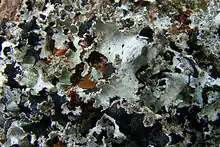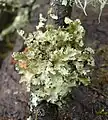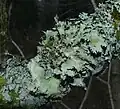Platismatia
Platismatia is genus of medium to large foliose lichens in the family Parmeliaceae.[1] The genus is widespread and contains 11 species. They resemble many other genera of foliose lichens in the Parmeliaceae, particularly Parmotrema, Cetrelia, and Asahinea. Most species are found in forests on the trunks and branches of conifer trees, although some species grow on rocks.[2]
| Platismatia | |
|---|---|
 | |
| Platismatia glauca growing on a Nothofagus tree on Isla Navarino, Chile. | |
| Scientific classification | |
| Domain: | Eukaryota |
| Kingdom: | Fungi |
| Division: | Ascomycota |
| Class: | Lecanoromycetes |
| Order: | Lecanorales |
| Family: | Parmeliaceae |
| Genus: | Platismatia W.L.Culb. & C.F.Culb. (1968) |
| Type species | |
| Platismatia glauca (L.) W.L.Culb. & C.F.Culb. (1968) | |
| Species | |
|
See text | |
Species of Platismatia can be used to produce an orange-brown, yellow-brown, or brown dye,[3] and at least one species was traditionally used to dye wool in Europe.[4]
Species
- Platismatia erosa W.L.Culb. & C.F.Culb. (1968)
- Platismatia formosana (Zahlbr.) W.L.Culb. & C.F.Culb. (1968)
- Platismatia glauca (L.) W.L.Culb. & C.F.Culb. (1968)
- Platismatia herrei (Imshaug) W.L.Culb. & C.F.Culb. (1968)
- Platismatia interrupta W.L.Culb. & C.F.Culb. (1968)
- Platismatia lacunosa (Ach.) W.L.Culb. & C.F.Culb. (1968)
- Platismatia norvegica (Lynge) W.L.Culb. & C.F.Culb. (1968)
- Platismatia regenerans W.L.Culb. & C.F.Culb. (1968)
- Platismatia stenophylla (Tuck.) W.L.Culb. & C.F.Culb. (1968)
- Platismatia tuckermanii (Oakes) W.L.Culb. & C.F.Culb. (1968)
- Platismatia wheeleri Goward, Altermann & Björk (2011)
Gallery
 Platismatia glauca, Schwäbisch-Fränkische Waldberge, Germany
Platismatia glauca, Schwäbisch-Fränkische Waldberge, Germany Platismatia glauca, Schwäbisch-Fränkische Waldberge, Germany
Platismatia glauca, Schwäbisch-Fränkische Waldberge, Germany Platismatia wheeleri, Underside of thallus; Yelm, Washington, United States
Platismatia wheeleri, Underside of thallus; Yelm, Washington, United States Platismatia tuckermanii, on Spruce branch in Nova Scotia, Canada
Platismatia tuckermanii, on Spruce branch in Nova Scotia, Canada
References
- Wijayawardene, N.N.; Hyde, K.D.; Dai, D.Q.; Sánchez-García, M.; Goto, B.T.; Saxena, R.K.; et al. (2022). "Outline of Fungi and fungus-like taxa – 2021". Mycosphere. 13 (1): 53–453. doi:10.5943/mycosphere/13/1/2. S2CID 249054641.
- Brodo, I. M., S. D. Sharnoff, and S. Sharnoff. 2001. Lichens of North America. Yale University Press: New Haven.
- Brough, S. G. 1984. Dye characteristics of British Columbia forest lichens. Syesis 17: 81-94.
- Uphof, J. C. T. 1959. Dictionary of Economic Plants. Hafner Publishing Co.: New York.
This article is issued from Wikipedia. The text is licensed under Creative Commons - Attribution - Sharealike. Additional terms may apply for the media files.